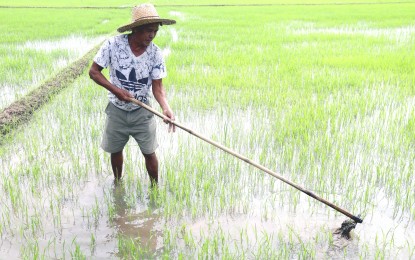
(PNA photo by Oliver Marquez)
MANILA – The Department of Agrarian Reform (DAR) wants agrarian reform beneficiaries (ARBs) to be self-sufficient, agrarian cooperatives to be progressive, and agrarian reform communities (ARCs) to be sustainable and resilient within the next six years.
These are among the plans of Secretary Conrado Estrella III contained in his priorities that he presented during the fourth Cabinet meeting of President Ferdinand Marcos Jr. at Malacañang Palace on Friday.
In a statement issued Tuesday, Estrella said DAR’s goals would be his guide in creating strategic plans.
Estrella hopes to implement interventions on land tenure problems through the moratorium on the payment of amortization fees and interests and pursue an aggressive, full-scale parcellation program under the Support to Parcelization of Lands for Individual Titling (SPLIT).
The delivery of swift agrarian justice will be solved by hiring additional lawyers who will review pending cases, conduct fast-tracking activities, and enhance the monitoring system.
DAR also plans to intensify the delivery of modern farm equipment, fertilizers, and other needed inputs, including provision for credit assistance, capacity development, and marketing assistance for farm products.
It will tap the Department of Health for subsidies and inclusion of medical assistance for ARBs under the Medical Assistance for Indigent Patients program.
There will likewise be assistance for the educational expenses of children of ARBs; intervention for technical skills of farmers by upgrading their skills based on scientific methods through the Technical Education and Skills Development Authority; and farm-to-market roads by partnering with the Department of Agriculture and Department of Public Works and Highways.
Estrella wants to help ARBs earn additional income via livestock farming through diversified income sources and provide irrigation for ARBs and ARCs, as the absence or lack of applying controlled amounts of water is a major reason for low production.
Estrella said he is targeting to achieve 80 percent or 743,800 ARBs with improved productivity and increased income; 85 percent or 7,800 agrarian cooperatives with established and stable viable business operations managed by the ARBs; and 80 percent or 1,300 ARCs with improved business ecosystems and connectivity.
“I am confident that with these nine priority goals, the workforce of the department will do its best to implement programs and projects that will hasten land distribution, delivery of support services, and improve the economic lives of farmers,” Estrella said. (PNA)
